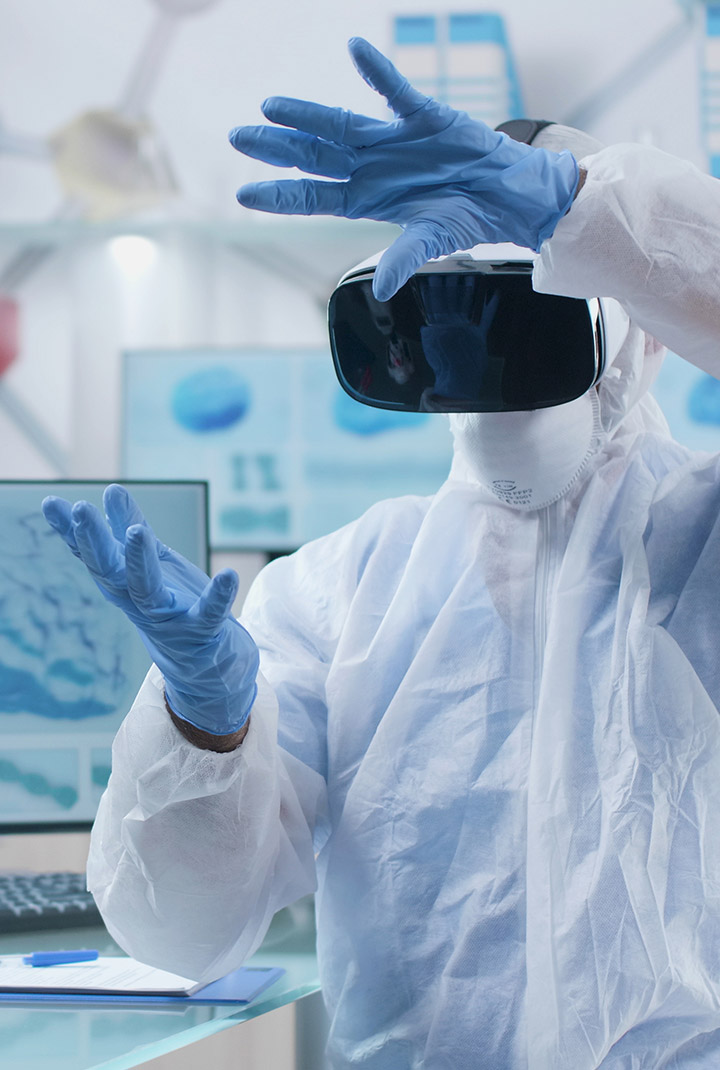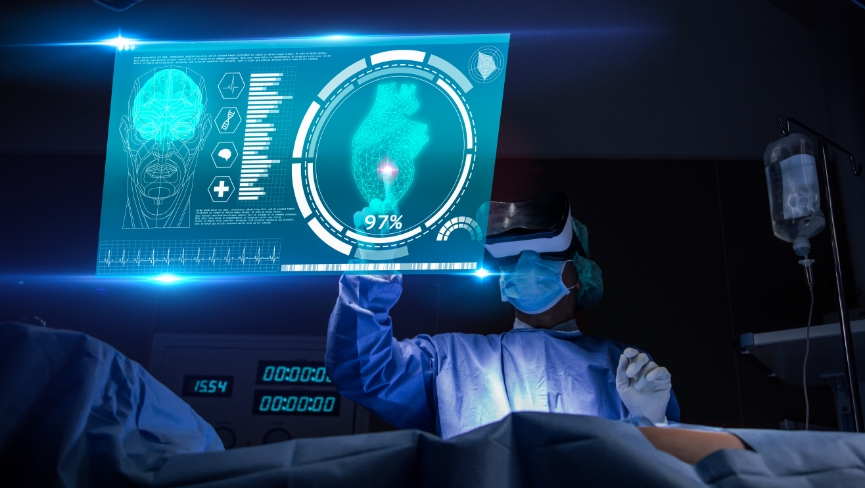
Realize The Marvels Of AR, VR And MR with Immersive Media Technologies
Augmented Reality (AR) is the technology that overlays digital information on top of the real world. It has been around for decades, but only recently has it begun to be applied in healthcare.
- AR can be used in a number of ways in healthcare. One example is medical training. Doctors can use AR to simulate surgeries and operations, allowing them to gain experience without putting patients at risk. AR can also be used to create 3D models of organs and body parts, which can be helpful for planning complex procedures.
- Patients can also benefit from AR technology. For example, AR can be used to provide real-time instructions to patients who are recovering from surgery. This can help ensure they are correctly following their post-operative care plan.
- Additionally, AR can be used to create virtual reality (VR) experiences that can help distract patients from pain or discomfort during procedures such as MRIs or dental work.
Overall, AR has the potential to revolutionize healthcare. By providing doctors with new ways to train and plan surgeries and by giving patients new ways to cope with pain and anxiety, AR has the potential to transform the medical landscape.
The Potential of Augmented Reality Technology in Healthcare Industry
Imagine a future where you no longer need to rely on second-hand accounts or textbooks to learn about human anatomy. Instead, you can strap on a pair of augmented reality glasses and see a live, three-dimensional rendering of the human body – complete with organs, muscles, and bones. This is just one of the many potential applications of augmented reality technology in healthcare.
By overlaying digital information on the real world, augmented reality has the potential to revolutionize how we provide medical care. Doctors could use AR glasses to view a patient’s vital signs in real-time or to get step-by-step instructions during surgery. On the other hand, patients could use AR to understand their diagnosis or treatment plan better. And medical students could benefit from immersive AR experiences that bring textbook concepts to life.
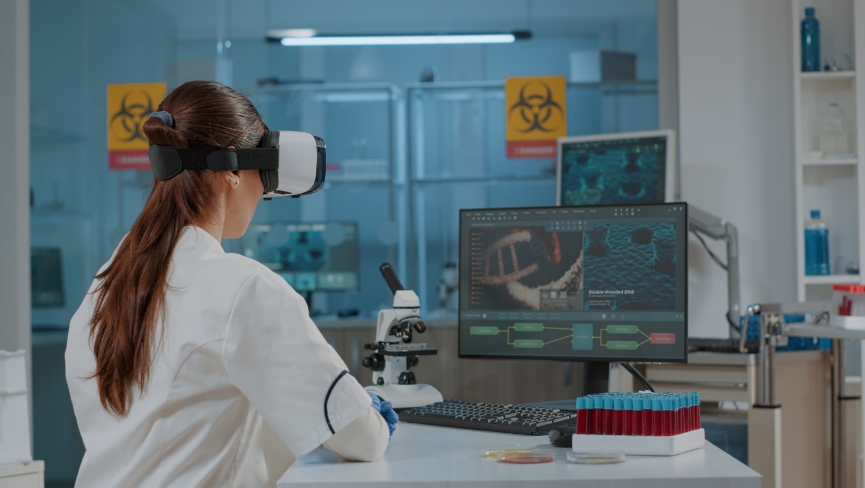
Of course, there are still many challenges to overcome before we can realize the full potential of AR in healthcare. But with continued research and development, we may one day find ourselves living in a world where augmented reality is an integral part of the medical landscape.
Various Immersive Technologies trending today

Augmented Reality

Mixed Reality

Virtual Reality
Industries we serve with our Enterprise Immersive Solutions of AR/VR and MR

Core Education

Healthcare

Training

Medical

Industrial

Behavioural

Marketing

E-Commerce

Gaming

Entertainment
Augmented Reality And Healthcare: A Great Match
Augmented reality (AR) is quickly catching up in various industries, and healthcare is no exception. AR has the potential to revolutionize medical care, making procedures simpler and more efficient while also enhancing the patient experience. Here are just a few ways that AR could transform healthcare:
01Surgery
AR could be used to provide doctors with real-time data and guidance during surgery. This would allow for more complex surgeries to be performed with greater precision and fewer complications.
02Training
AR could be used to train medical students in a more realistic and interactive environment. This would give them a better understanding of human anatomy and how to perform various procedures.
03Treatment
AR could be used to help doctors treat patients in remote locations. This would enable them to receive real-time guidance from specialists, regardless of location.
04Rehabilitation
AR could be used to create customized rehabilitation programs for patients recovering from injuries or illnesses, and this would allow for a faster and more complete recovery.
In each case, AR provides an enhanced view that can lead to better outcomes. For example, surgeons who use AR during training can gain a deeper understanding of the procedure they are learning and make fewer errors when they perform it in the operating room.
Similarly, AR has been shown to improve patient outcomes by providing real-time feedback during physical therapy.
With a range of potential applications for AR in healthcare, this technology can significantly improve the quality of medical care while also making it more accessible and affordable. It will be exciting to see how these applications develop in the coming years.
Pharmaceuticals and Augmented Reality
- The healthcare industry is always in search for new ways to improve patient care and treatment. One area that is currently being explored is the use of augmented reality (AR) and mixed reality in pharmaceuticals. AR technology allows users to interact with digital content in a real-world environment.
- This means that patients could take their medication while also viewing information about the drug, such as how it works and what side effects to expect. AR could also provide instructions on how to take the medication or remind patients when it is time to take their next dose.
- In addition, AR could be used to create virtual simulations of medical procedures, which could be used to train future healthcare professionals. While the use of AR in pharmaceuticals is still in its early stages, it has the potential to revolutionize the way that medications are prescribed and taken.
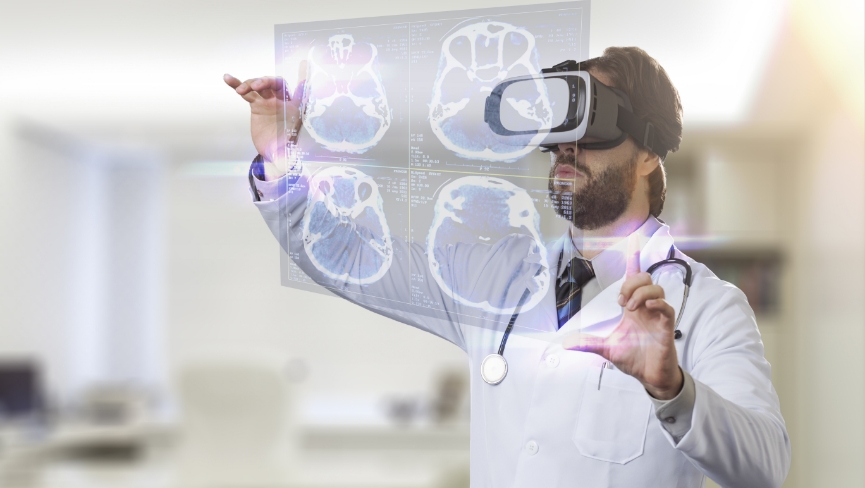
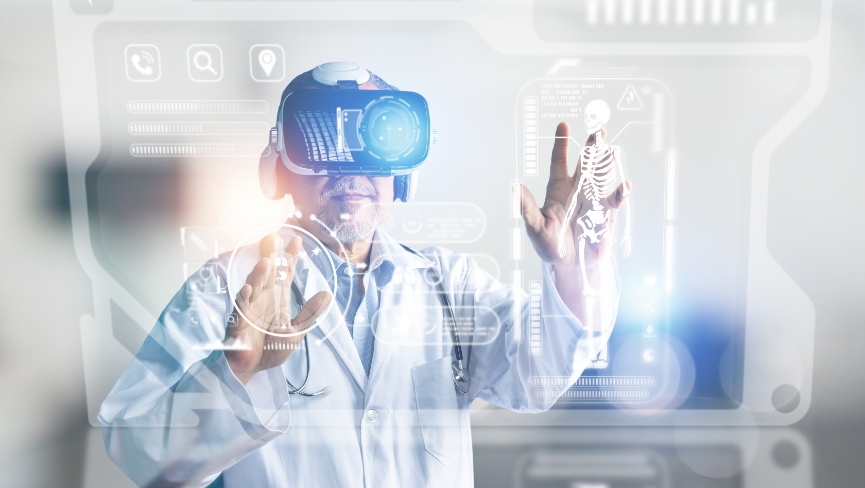
How Hospitals and Doctors Can Benefit From AR Technology
- Healthcare is an industry that is constantly evolving, and new technologies are often developed to help doctors and patients alike. One such technology is augmented reality or AR. AR has a number of potential applications in the medical field, from helping doctors with surgery to providing patients with information about their condition.
- For example, AR could be used to train new surgeons. By overlaying virtual images onto real-world objects, AR can provide a realistic simulation of surgical procedures. This would allow trainees to get a feel for the surgery before they ever step into the operating room. In addition, AR can be used to create 3D models of a patient’s organs, which can help plan complicated surgeries.
- Patients can also benefit from AR technology. For instance, AR applications can be used to provide patients with information about their condition. This could include visualizations of their symptoms or explaining the side effects of their medication. Additionally, AR can be used to provide guidance and instructions for patients who are recovering from surgery or undergoing physical therapy.
How Augmented Reality is Used in Healthcare?
Augmented reality (AR) is quickly catching up in various industries, and healthcare is no exception. AR has the potential to revolutionize medical care, making procedures simpler and more efficient while also enhancing the patient experience. Here are just a few ways that AR could transform healthcare:
01AR is Being Used to Train Surgeons
One of the most promising applications of Augmented Reality in healthcare education is its ability to train surgeons. Surgery is a complex procedure that requires a great deal of precision and skill. AR an d VR service can be used to create realistic simulations of surgical procedures that can help surgeons to hone their skills and better prepare for surgery.
02AR is Being Used to Plan Surgeries
Augmented and virtual reality in healthcare is also being used to plan surgeries. By using AR, surgeons can get a better understanding of the patient’s anatomy and plan the surgery accordingly. This can help to reduce the risk of complications and ensure that the surgery is performed as safely and effectively as possible.
03AR is Being Used to Aid in Diagnosis
AR is also being used to aid in diagnosis. Doctors can use AR to view CT scans and X-rays in 3D, which can help them to more accurately diagnose patients. Additionally, AR can be used to view MRI and PET scans, which can provide even more detailed information about a patient’s condition.
04AR is Being Used to Treat Patients With Dementia
AR is also being used to treat patients with dementia. Patients with dementia often have trouble orienting themselves in space and remembering where they are. AR can be used to provide visual cues that can help these patients to orient themselves and remember where they are. Additionally, AR can be used to provide stimulating and engaging content that can help patients with dementia to stay active and engaged.
05AR is Being Used To Educate Patients About Their Health
Virtual and augmented reality in healthcare is also being used to educate patients about their health. Patients can use AR applications to learn more about their conditions, medications, and treatments. Additionally, AR can be used to provide instructions on how to perform self-care tasks such as taking medication or changing a bandage
What Are The Benefits of Augmented Reality to Patients and Health Industries?
Augmented reality (AR) is quickly catching up in various industries, and healthcare is no exception. AR has the potential to revolutionize medical care, making procedures simpler and more efficient while also enhancing the patient experience. Here are just a few ways that AR could transform healthcare:
01AR Can Help Patients Visualize Their Treatment
Augmented reality in healthcare can be used to help patients visualize their treatment. For example, a patient with cancer may be able to see a 3D model of their tumor and how it is responding to treatment. This can help to improve patient understanding and compliance with their treatment plan.
02AR Can Be Used for Education and Training
Virtual and augmented reality in healthcare can also be used for educational and training purposes. For example, medical students can use AR to learn about human anatomy or to practice procedures. Similarly, AR can be used to train surgeons on new techniques or to allow them to rehearse complex surgeries.
03AR Can Help With Diagnosis and Treatment
AR in healthcare can also be used to help with diagnosis and treatment. For example, AR can be used to provide real-time information about a patient’s condition, such as their heart rate or blood pressure. Additionally, AR can be used to guide doctors during procedures or surgeries.
04AR in Medicine and how It Can Improve Patient Safety
AR in healthcare can also improve patient safety by reducing the risk of errors. For example, if a doctor is performing a procedure on a patient, they can use AR to double-check that they are using the correct medication or dose. Additionally, augmented and virtual reality in healthcare can be used to provide real-time alerts if a patient’s condition changes suddenly.
02AR Can Increase Efficiency in Medical Field
Augmented reality can increase efficiency by reducing the need for repetitive tasks. For example, if a doctor is caring for a patient with multiple chronic conditions, they can use AR to quickly access the relevant information about each condition. This can save time and allow doctors to see more patients
What is The Best Example of A Potential Application of Augmented Reality in Healthcare?
Augmented reality (AR) is quickly catching up in various industries, and healthcare is no exception. AR has the potential to revolutionize medical care, making procedures simpler and more efficient while also enhancing the patient experience. Here are just a few ways that AR could transform healthcare:
Medical Training
One potential application of augmented reality in healthcare is medical training. AR could be used to create realistic simulations of medical procedures, allowing trainees to get hands-on experience without putting patients at risk. This would be especially beneficial for procedures that are rare or have a high risk of complications. Additionally, mixed reality simulations in healthcare could be used to train medical teams in communication and coordination, as well as to assess individual skills and knowledge.
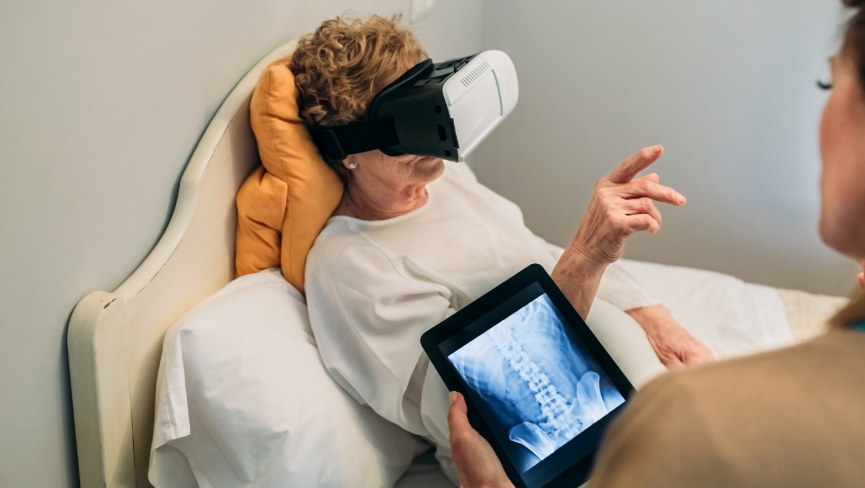
What Are The Four Benefits of Using AR And VR in Healthcare?
It’s no secret that the healthcare industry is always looking for ways to improve patient care and outcomes. And one area that is beginning to gain traction is the use of augmented reality (AR) and virtual reality (VR). Here are four ways that AR and VR are being used in healthcare:
01Treatment Planning
AR and VR can be used to help doctors plan complex surgeries or procedures. By having a three-dimensional view of the patient, doctors can better understand the anatomy and plan the best approach.
02Training and Education
Mixed reality can also be used to train medical students or provide continuing education for practicing doctors. For example, students can use VR to experience different procedures or conditions, which can help them better understand the material. Doctors can also use VR to brush up on their skills or learn new techniques.
03Patient Care
AR and VR are being used more and more to directly improve patient care. For example, VR is being used to provide distraction therapy for patients undergoing painful procedures. Additionally, AR is being used in doctor's offices and hospitals to help patients better understand their condition and treatment options.
01Research
Augmented reality and virtual reality in healthcare market are also being used in research to help develop new treatments and cures for disease. For example, VR is being used to study how Alzheimer's disease affects the brain. Additionally, AR is being used to map out genes associated with cancer.

Conclusion
As you can see, there are a number of ways that AR and VR are being used in healthcare. And as technology continues to evolve, it’s likely that we’ll see even more amazing applications for these cutting-edge technologies.
AR has the potential to revolutionize healthcare and make it more efficient, personalized, and accurate. With the ever-growing field of AR, healthcare is one industry that is sure to see great advances in the years to come. Are you ready for the future of augmented reality in healthcare?
Stay connected for more information.
